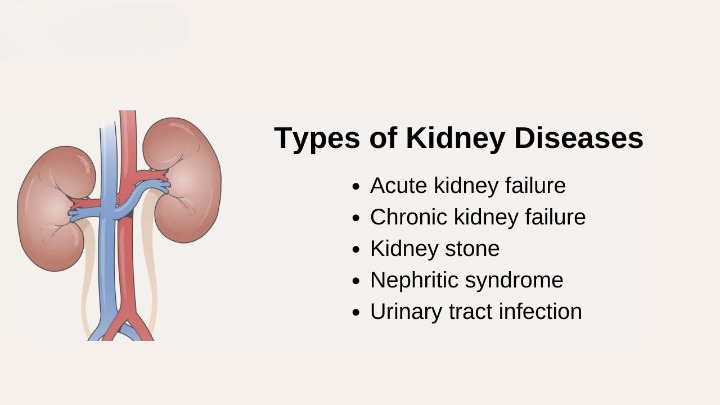Kidney diseases encompass a wide range of conditions that affect the kidneys’ structure and function, necessitating various forms of treatment to manage symptoms, slow disease progression, and preserve kidney function.
Here’s an overview of different types of kidney diseases that commonly require treatment:
1. Chronic Kidney Disease (CKD):
- CKD is a progressive condition where kidney function declines over time, often due to conditions like diabetes, hypertension, glomerulonephritis, or polycystic kidney disease.
- Treatment aims to control underlying conditions, manage complications, and delay progression through lifestyle changes, medications (e.g., blood pressure control, cholesterol management), and sometimes dialysis or kidney transplant in advanced stages.
2. Acute Kidney Injury (AKI):
- AKI is a sudden loss of kidney function, typically caused by conditions like severe infection, dehydration, medications, or kidney injury.
- Treatment focuses on identifying and addressing the underlying cause, optimizing fluid and electrolyte balance, and providing supportive care to aid kidney recovery.
3. Glomerulonephritis:
- Glomerulonephritis involves inflammation of the kidney’s filtering units (glomeruli), leading to impaired kidney function and potential damage.
- Treatment depends on the specific type of glomerulonephritis and may include medications to reduce inflammation (such as corticosteroids or immunosuppressants) and manage complications.
4. Polycystic Kidney Disease (PKD):
- PKD is a genetic disorder characterized by the growth of numerous cysts in the kidneys, which can lead to kidney enlargement, impaired function, and eventually kidney failure.
- Treatment focuses on managing symptoms, controlling blood pressure, preventing complications (such as infections or kidney stones), and addressing cyst-related issues through medications or, in severe cases, dialysis or kidney transplant.
5. Kidney Stones:
- Kidney stones are hard deposits of minerals and salts that form inside the kidneys, causing severe pain and potential blockage of urine flow.
- Treatment options include pain management, increased fluid intake to facilitate stone passage, medications to dissolve stones, or procedures like lithotripsy (using shock waves) or laser therapy to break up larger stones.
6. Kidney Cancer:
- Kidney cancer can originate in the kidneys (renal cell carcinoma) or spread from other organs.
- Treatment may involve surgery to remove tumors, targeted therapy, immunotherapy, or radiation therapy depending on the stage and extent of cancer.
7. Diabetic Nephropathy:
- Diabetic nephropathy is kidney damage caused by diabetes, particularly when blood sugar levels are poorly controlled over time.
- Treatment includes tight control of blood sugar and blood pressure, medications (such as ACE inhibitors or ARBs) to protect kidney function, and lifestyle modifications.
8. Alport Syndrome:
- Alport syndrome is a genetic disorder affecting the glomerular basement membrane in the kidneys, leading to progressive kidney damage.
- Treatment focuses on managing symptoms, preserving kidney function through medications and blood pressure control, and potentially kidney transplant in advanced cases.
9. Lupus Nephritis:
- Lupus nephritis is kidney inflammation caused by systemic lupus erythematosus (SLE), an autoimmune disease.
- Treatment includes immunosuppressive medications, corticosteroids, and other therapies to reduce inflammation, manage symptoms, and preserve kidney function.
10. Congenital Kidney Disorders:
- Congenital kidney disorders are present at birth and can include structural abnormalities, inherited conditions like cystic kidney diseases, or developmental disorders.
- Treatment varies based on the specific disorder and may involve medications, surgical interventions, and supportive care to manage symptoms and complications.
In summary, effective management of kidney diseases requires a tailored approach that addresses the underlying cause, manages symptoms, and aims to preserve kidney function. Treatment strategies may include medications, lifestyle modifications, dialysis, or kidney transplant, depending on the type and severity of the condition. Early diagnosis and proactive management are crucial in improving outcomes and quality of life for individuals with kidney diseases.





Comments